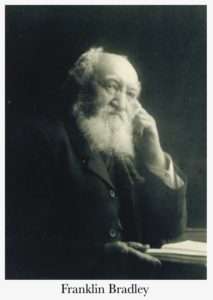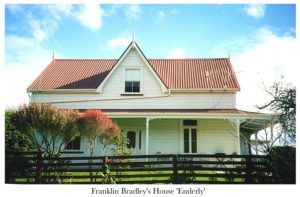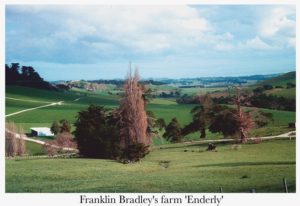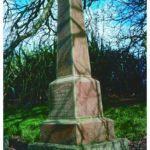
Franklin Bradley (February 2, 1831 – May 3, 1909) was a Non-Subscribing Presbyterian minister in Northern Ireland and England and the first minister to Unitarians in Auckland, New Zealand. Subsequently he was a pioneer farmer, Justice of the Peace, and community leader in Arapohue, New Zealand.
Born at Carsonstown, Saintfield, County Down, Northern Ireland, Franklin was one of eleven children of Alexander and Susannah Bradley. His father, a Wesleyan, was a farmer and hotel keeper in Saintfield. His mother was Unitarian. Franklin studied until 1849 at the Collegiate Department of the Royal Belfast Academical Institution. Under the care of the Remonstrant Synod of Ulster, Presbytery of Bangor, 1850-55, Bradley was taught by two of his professors, Henry Montgomery, leader of the Synod and an Arian, and William Bruce. Having been given a license to preach, Bradley served the Bowden Hill Chapel, at Credition in Devon, 1855-59.
In 1859 the Presbytery of Bangor ordained Bradley to the pastoral charge of the congregation of Ravara, County Down, a position he held until 1862. He succeeded John Jellie, whose nephew, William Jellie, was to follow Bradley as the second minister at Auckland. He was active in the Remonstrant Synod of Ulster, attending a special meeting in 1860 where he joined with others in objecting to tests being put to entrants to the ministry.
While at Credition Bradley learned of another Unitarian, Thomas Alexander Kidd, formerly a Magistrate and Police Commissioner of Newry, who had gone to New Zealand in 1859. Subsequently the Kidd family sent back favorable reports about their new country. When Bradley returned to Ireland he discussed the possibility of emigrating with his family. Except for one brother who was a Royal Navy surgeon, they all decided to go to New Zealand. At this time the Auckland Provincial Council, offering land grants, attracted many non-conformists to the Albertland settlement, north of Auckland. After a rough voyage the Bradley family arrived in Auckland in 1863. The Bradleys decided to acquire better land north of Albertland at Arapohue. Because the land was as yet unsurveyed and war had broken out between the settler government and the Maori, they remained in Auckland and started a firewood business.

About this time a Unitarian Society had been formed in Auckland. In 1861 there were 161 Unitarians in New Zealand, half of whom were in Auckland; by 1864 the total had increased to 296. Although Bradley had been given books by the Belfast Unitarian Tract Society to assist in forming a congregation, he made it clear that his Auckland ministry would only last until he could take up farming. The first service took place in 1863 at the Odd Fellows’ Hall. Bradley was ably assisted by the Chairman, Richard Ridings, and the Secretary, Fredric J. Utting. Members of the congregation edited and published Hymns for Christian Worship, 1863.
In the first few months the congregation increased steadily, collections covered expenses, and the committee expected to be able to raise 150 pounds per annum towards a minister’s salary. In 1864 they resolved to build a chapel and to ask the British and Foreign Unitarian Association (BFUA) to send out a minister to relieve Bradley. They hoped that the BFUA might contribute to the building fund rather than make a grant in aid of a minister’s stipend. Circulars were sent for distribution and the BFUA was asked to advertise in the Inquirer and Unitarian Herald seeking donations or subscriptions.
The BFUA, however, did not provide substantial help. They sent a supply of books and tracts, and their regrets. There were no applications from ministers for the pastoral charge at Auckland. The church saved on hall hire by meeting in an auction house owned by a member of the congregation. In 1865 the Bradley family finally moved to their land in Arapohue. The Unitarian congregation continued to meet under the leadership of Utting, a civil engineer and surveyor. When Utting moved to Albertland in 1866, the first Auckland Unitarian church faded out of existence.

While visiting Thomas Kidd in the Bay of Islands, Bradley fell in love with Georgina, one of Kidd’s daughters. They eloped in 1865. Life at Arapohue was hard for the first few years, breaking in the land and building permanent houses. Bradley’s own house, Enderly, was not completed until 1873. Franklin and Georgina had seven sons and two daughters.
In 1869 Bradley was appointed Justice of the Peace. Cases of cattle rustling, assault and murder appeared before the court. Between 1870 and 1872 he was a member of the local Road Board which made contracts with farmers to cut roads out of the bush. Following the abolition of Provincial Government, Bradley stood for Parliament in 1876 contesting the Marsden seat in the general election. He lost to Sir Robert Douglas. In the election in 1890, following Sir Robert’s retirement, Bradley addressed a political meeting which carried resolutions in favor of the abolition of property tax, more land for settlement, and free secular and compulsory education. Because a number of his children had attended the Arapohue School in the 1880s Bradley took an interest in education and served a term as chairman of the school committee. As first president of the Northern Wairoa Agricultural and Pastoral Association, 1892-94, he is remembered as being a strong advocate of an annual show.
In 1900 William Jellie arrived in New Zealand to take pastoral charge of the Auckland Unitarian Church, which had been reestablished under lay leadership in 1898. He soon sought out his predecessor and fellow countryman. At the inaugural service of the Auckland church building in 1901, when Jellie preached to a congregation of about 250, one of the speakers was Bradley.
Death

Bradley died at Enderly. A graveside service at the Arapohue Cemetery was conducted by F. W. Young, Anglican Vicar of Northern Wairoa. Georgina was buried next to Franklin in 1922. Afterwards an obelisk was erected to commemorate their lives.
Sources
For primary information on Bradley and the Auckland church see Northern Ireland Presbyterian Historical Society Archives; Minutes of the Remonstrant Synod of Ulster, 1860; The Inquirer (1 November 1862 and 28 January, 1865); annual reports of the British and Foreign Unitarian Association, 1864-65; Samuel Bradley, “The Diaries of Samuel Bradley November 1868-December 1874” (unpublished manuscript); and Auckland Unitarian Church Calendar (May 1901 and June 1909). On the Bradleys see “The Story Of The Bradley Family Which Settled In Arapohue In 1865,” New Zealand Biographies (1952) and K. F. Bradley, The Bradley Family Tree 1863-2003 (n.d.). On the Auckland Unitarian church see “Early Days of Auckland Unitarianism”, Auckland Unitarian Church News and Views (April 1968) and J. Maindonald, A Radical Religious Heritage (1993). See also R. D. Woodall, “Bowden Hill Chapel, Credition”, Transactions of the Unitarian Historical Society (1964); J. Stallworthy Early Northern Wairoa (1916); C. L. Shepherd, “The Albertland Christian Colonisation Movement” (MA Thesis, Auckland University College, 1942); and L. J. Owen, 126 Years in New Zealand: The Utting Story, 1860-1986 (1986). There is an obituary in New Zealand Free Lance (8 May 1909).
Article by Wayne Facer
Posted November 15, 2006